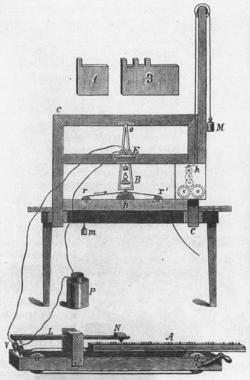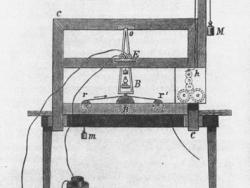In February 1837, Treasury Secretary Levi Woodbury called for information from the “most intelligent sources” to help prepare a report to Congress on the propriety of establishing a “system of telegraphs” for the United States. Of the 18 responses he received, 17 assumed that the telegraph would be optical and its motive power human. The only respondent to envision a different operating force was Samuel F. B.
Morse, Samuel F. B.

In January 1838, Samuel F. B. Morse and Alfred Vail first demonstrated publicly crucial elements of their telegraph system, using instruments that Vail had constructed during the previous months. Electrical pulses, transmitted through two miles of wire, caused an electromagnet to ink dots and dashes (grouped to represent letters and words) on a strip of paper. Commercialization began in 1844 when funding became available.
A ministerial student, a professor of fine arts, and a prominent industrialist...
YearAdded:
Image Credit: Courtesy WikipediaImage Caption: The original Samuel Morse telegraphEra_date_from: 1838
1988
Spring 2010 | Volume 25, Issue 1
In February 1837, Treasury Secretary Levi Woodbury called for information from the “most intelligent sources” to help prepare a report to Congress on the propriety of establishing a “system of telegraphs” for the United States. Of the 18 responses he received, 17 assumed that the telegraph would be…
Innovations

In January 1838, Samuel F. B. Morse and Alfred Vail first demonstrated publicly crucial elements of their telegraph system, using instruments that Vail had constructed during the previous months. Electrical pulses, transmitted through two miles of wire, caused an electromagnet to ink dots and… Read More


